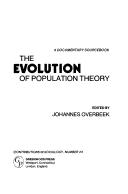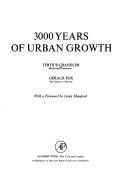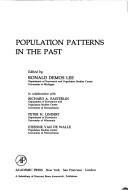| Listing 1 - 10 of 12 | << page >> |
Sort by
|

ISBN: 0837193133 9780837193137 Year: 1977 Volume: 23 Publisher: Westport, Conn.: Greenwood,
Abstract | Keywords | Export | Availability | Bookmark
 Loading...
Loading...Choose an application
- Reference Manager
- EndNote
- RefWorks (Direct export to RefWorks)
Population. --- Population --- Human population --- Human populations --- Population growth --- Populations, Human --- Economics --- Human ecology --- Sociology --- Demography --- Malthusianism

ISBN: 0127851097 1483271250 9780127851099 Year: 1977 Publisher: New York:
Abstract | Keywords | Export | Availability | Bookmark
 Loading...
Loading...Choose an application
- Reference Manager
- EndNote
- RefWorks (Direct export to RefWorks)
3000 Years of Urban Growth compiles urban population data acquired from large cities at different points in time throughout the centuries. This book describes the sources and methods used in historical urban studies, including an evaluation of the total size estimates, area, institutional factors, and volume of local activity. Illustrations of maps that locate large cities from several time tables and regions of the world are also provided. This text likewise covers the data sheets for ancient cities from 1360 B.C. to 200 B.C. and 100 A.D. to 622 A.D. The data sheets from 800 to 1850 A.D. provide estimates for countries such as Italy, Afghanistan, France, Brazil, India, and Russia. Other topics include the world's largest cities from 430 B.C. to200 B.C., top six cities in each continent from 800 to 1850, and whereabouts of unfamiliar cities not shown on the maps. This publication is a good source for sociologists, historians, and researchers interested in population studies.
Population Growth. --- Urban Population. --- Urban Spatial Distribution --- Distribution, Urban Spatial --- Distributions, Urban Spatial --- Population, Urban --- Populations, Urban --- Urban Populations --- Urban Spatial Distributions --- Cities --- Baby Boom --- Baby Bust --- High Fertility Population --- Natural Increase --- Past Trends --- Population Growth and Natural Resources --- Population Size and Growth --- Zero Population Growth --- Population Explosion --- Baby Booms --- Baby Busts --- Explosion, Population --- Explosions, Population --- Growth, Population --- High Fertility Populations --- Increase, Natural --- Increases, Natural --- Natural Increases --- Past Trend --- Population Explosions --- Population, High Fertility --- Populations, High Fertility --- Trend, Past --- Trends, Past --- Population Forecast --- Population Growth --- Urban Population --- Croissance urbaine --- Population --- Ville --- Urban Residence --- Residence, Urban --- Urban Residences
Book
ISBN: 013493122X Year: 1977 Publisher: Englewood Cliffs (N.J.) : Prentice-Hall,
Abstract | Keywords | Export | Availability | Bookmark
 Loading...
Loading...Choose an application
- Reference Manager
- EndNote
- RefWorks (Direct export to RefWorks)
314 <036> --- Population --- #SBIB:314H210 --- #SBIB:314H284 --- Human population --- Human populations --- Population growth --- Populations, Human --- Economics --- Human ecology --- Sociology --- Demography --- Malthusianism --- Demografie. Bevolkingsleer--Gidsen. Inleidingen --- Demografie: algemeenheden --- Demografie en sociale demografie --- Population. --- 314 <036> Demografie. Bevolkingsleer--Gidsen. Inleidingen
Book
ISBN: 912200114X 9789122001140 Year: 1977 Publisher: Stockholm: Almqvist och Wiksell,
Abstract | Keywords | Export | Availability | Bookmark
 Loading...
Loading...Choose an application
- Reference Manager
- EndNote
- RefWorks (Direct export to RefWorks)
Population. --- Demography. --- 314.1 --- Population --- Demography --- #SBIB:314H160 --- #SBIB:314H284 --- Historical demography --- Social sciences --- Vital statistics --- Human population --- Human populations --- Population growth --- Populations, Human --- Economics --- Human ecology --- Sociology --- Malthusianism --- Algemene demografische vraagstukken --- Bevolkingsstudies: onderzoeks- en analysemethoden --- Demografie en sociale demografie --- 314.1 Algemene demografische vraagstukken

ISBN: 0124418503 9780124418509 Year: 1977 Publisher: New York: Academic press,
Abstract | Keywords | Export | Availability | Bookmark
 Loading...
Loading...Choose an application
- Reference Manager
- EndNote
- RefWorks (Direct export to RefWorks)
Population --- History --- Congresses. --- 314.148 --- -#SBIB:314H160 --- #SBIB:314H284 --- Human population --- Human populations --- Population growth --- Populations, Human --- Economics --- Human ecology --- Sociology --- Demography --- Malthusianism --- Historische demografie --- -Congresses --- Bevolkingsstudies: onderzoeks- en analysemethoden --- Demografie en sociale demografie --- 314.148 Historische demografie --- #SBIB:314H160 --- History&delete& --- Congresses --- Population - History - Congresses.

ISBN: 0301740313 Year: 1977 Publisher: London Elek-Pemberton
Abstract | Keywords | Export | Availability | Bookmark
 Loading...
Loading...Choose an application
- Reference Manager
- EndNote
- RefWorks (Direct export to RefWorks)
314.1 --- Population --- Economic development --- #SBIB:314H210 --- Development, Economic --- Economic growth --- Growth, Economic --- Economic policy --- Economics --- Statics and dynamics (Social sciences) --- Development economics --- Resource curse --- Human population --- Human populations --- Population growth --- Populations, Human --- Human ecology --- Sociology --- Demography --- Malthusianism --- Algemene demografische vraagstukken --- Demografie: algemeenheden --- Economic development. --- Population. --- 314.1 Algemene demografische vraagstukken

ISBN: 0713158484 9780713158489 Year: 1977 Publisher: London: Edward Arnold,
Abstract | Keywords | Export | Availability | Bookmark
 Loading...
Loading...Choose an application
- Reference Manager
- EndNote
- RefWorks (Direct export to RefWorks)
Biomathematics. Biometry. Biostatistics --- Demography --- 314.91 --- Migration, Internal --- -Population --- -Human population --- Human populations --- Population growth --- Populations, Human --- Economics --- Human ecology --- Sociology --- Malthusianism --- Internal migration --- Mobility --- Population geography --- Internal migrants --- Historical demography --- Social sciences --- Population --- Vital statistics --- 314.91 Bevolkingsspreiding naar geboorteplaats, naar woonplaats, naar verblijfplaats --(demografie) --- Bevolkingsspreiding naar geboorteplaats, naar woonplaats, naar verblijfplaats --(demografie) --- Mathematical models --- -Historical demography --- Human population --- Demography. --- Geografie --- Mathematical models. --- Sociale geografie --- Bevolking. --- -Bevolkingsspreiding naar geboorteplaats, naar woonplaats, naar verblijfplaats --(demografie) --- Migration, Internal - Mathematical models --- Population - Mathematical models --- Demographie --- Methodologie
Book
ISBN: 0691100535 0691197652 9780691100531 Year: 1977 Publisher: Princeton, N.J.: Princeton university press,
Abstract | Keywords | Export | Availability | Bookmark
 Loading...
Loading...Choose an application
- Reference Manager
- EndNote
- RefWorks (Direct export to RefWorks)
Comparison with stationary and very fast rates of population growth shows modern population grwoth to have long-run positive effects on the standards of living. This is Julian Simon's contention, and he provides support for its validity in both more and less-developed countries. He notes that since each person constitutes a burden in the short run, whether population growth is judged good or bad depends on the importance the short run is accorded relative to the long run.The author first analyzes empirical data, formulating his conclusions using simulation models. He then reviews our knowledge of the effect of economic level upon population growth. A final section of his book considers the framework of welfare economics and values within which population policy decisions are now made. He finds that the implications of policy decisions can prove inconsistent with the values that prompt their recommendation.Julian L. Simon is Professor of Economics and Business Administration at the University of Illinois.Originally published in 1977.The Princeton Legacy Library uses the latest print-on-demand technology to again make available previously out-of-print books from the distinguished backlist of Princeton University Press. These editions preserve the original texts of these important books while presenting them in durable paperback and hardcover editions. The goal of the Princeton Legacy Library is to vastly increase access to the rich scholarly heritage found in the thousands of books published by Princeton University Press since its founding in 1905.
Demography --- Population --- Fertility, Human --- Birth control --- Fécondité humaine --- Régulation des naissances --- Economic aspects --- Aspect économique --- Population. --- Birth Conrol --- Economic aspects. --- AA / International- internationaal --- 311.81 --- 330.34 --- 338.2 --- 314.82 --- -Population --- #SBIB:314H270 --- Human population --- Human populations --- Population growth --- Populations, Human --- Economics --- Human ecology --- Sociology --- Malthusianism --- Human fertility --- Natality --- Human reproduction --- Infertility --- Population control --- Pregnancy --- Family planning --- Contraception --- Reproductive rights --- Groei en vermindering van de bevolking. Economische theorie van de groeiende en afnemende bevolking. --- Economische ontwikkeling. Regionale economische ontwikkeling --- Economisch beleid. Economische politiek. Geleide economie. Plan --"tijd" --- Bevolkingstoename. Bevolkingsaanwas. Bevolkingsgroei --- Demografie en economische interrelaties: algemeen --- Prevention --- 314.82 Bevolkingstoename. Bevolkingsaanwas. Bevolkingsgroei --- 338.2 Economisch beleid. Economische politiek. Geleide economie. Plan --"tijd" --- 330.34 Economische ontwikkeling. Regionale economische ontwikkeling --- Fécondité humaine --- Régulation des naissances --- Aspect économique --- Groei en vermindering van de bevolking. Economische theorie van de groeiende en afnemende bevolking --- Birth control. --- SOCIAL SCIENCE --- Anthropology --- Physical. --- Demography. --- Fertility, Human - Economic aspects.
Book
ISBN: 0716703785 0716703777 9780716703778 9780716703785 Year: 1977 Publisher: San Francisco (Calif.): Freeman,
Abstract | Keywords | Export | Availability | Bookmark
 Loading...
Loading...Choose an application
- Reference Manager
- EndNote
- RefWorks (Direct export to RefWorks)
Plant husbandry --- Nutritionary hygiene. Diet --- Economic and applied botany --- Nutrition --- Food supply --- Food crops --- Population --- Agriculture --- 631 --- 338.439 --- 630*283 --- 612.39 --- 314 --- Human population --- Human populations --- Population growth --- Populations, Human --- Economics --- Human ecology --- Sociology --- Demography --- Malthusianism --- Alimentation --- Food --- Health --- Physiology --- Diet --- Dietetics --- Digestion --- Food habits --- Malnutrition --- Food control --- Produce trade --- Food security --- Single cell proteins --- Plants, Edible --- Field crops --- Horticultural crops --- Farming --- Husbandry --- Industrial arts --- Life sciences --- Land use, Rural --- Agriculture in general --- Economie van de voedselproductie. Economie van de voedingsindustrie. --- Fruit and seed crops --- Demografie. Bevolkingsleer --- Health aspects --- Agriculture. --- Food crops. --- Food supply. --- Nutrition. --- Population. --- 314 Demografie. Bevolkingsleer --- 612.39 Nutrition --- 630*283 Fruit and seed crops --- 338.439 Economie van de voedselproductie. Economie van de voedingsindustrie. --- 631 Agriculture in general --- Economie van de voedselproductie. Economie van de voedingsindustrie
Book
ISBN: 0716705672 0716700298 9780716700296 9780716705673 Year: 1977 Publisher: San Francisco : Freeman,
Abstract | Keywords | Export | Availability | Bookmark
 Loading...
Loading...Choose an application
- Reference Manager
- EndNote
- RefWorks (Direct export to RefWorks)
ecologie --- sociale ecologie --- energie-economie --- Nature protection --- Demography --- Environmental protection. Environmental technology --- Relation between energy and economics --- Human ecology. Social biology --- Population --- Pollution --- Human ecology --- Ecologie humaine --- Pollution. --- 502.31 --- Human population --- Human populations --- Population growth --- Populations, Human --- Economics --- Sociology --- Malthusianism --- Chemical pollution --- Chemicals --- Contamination of environment --- Environmental pollution --- Contamination (Technology) --- Asbestos abatement --- Bioremediation --- Environmental engineering --- Environmental quality --- Factory and trade waste --- Hazardous waste site remediation --- Hazardous wastes --- In situ remediation --- Lead abatement --- Pollutants --- Refuse and refuse disposal --- Ecology --- Environment, Human --- Human beings --- Human environment --- Ecological engineering --- Human geography --- Nature --- Interaction, interdependence of nature and society. Mutual benefits etc. --- Environmental aspects --- Control --- Social aspects --- Effect of environment on --- Effect of human beings on --- Human ecology. --- Population. --- Environmental Sciences and Forestry. Environmental Management --- Environmental Management (General) --- Milieubeheer --- Environmental Management (General). --- Milieubeheer. --- 502.31 Interaction, interdependence of nature and society. Mutual benefits etc. --- Interaction, interdependence of nature and society. Mutual benefits etc
| Listing 1 - 10 of 12 | << page >> |
Sort by
|

 Search
Search Feedback
Feedback About UniCat
About UniCat  Help
Help News
News